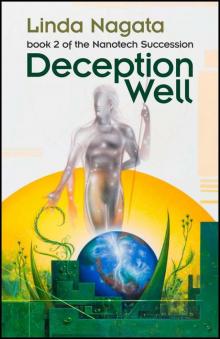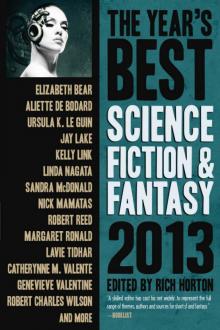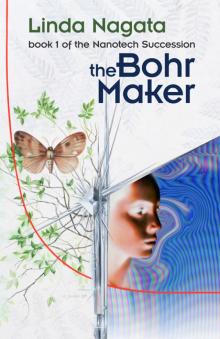- Home
- Linda Nagata
Deception Well (The Nanotech Succession Book 2) Page 4
Deception Well (The Nanotech Succession Book 2) Read online
Page 4
A little choking sound escaped Lot’s throat. Jupiter was gone and Mama was dead and Captain Antigua despised their people. He could see that now. What he’d taken for fury was really hate, and maybe she’d already betrayed the army and maybe that’s why Mama was dead. She didn’t deserve to receive the faith of Jupiter’s army. She didn’t deserve it, the lying, lying, dirty coward.
He rose quickly to his knees. “You don’t need her!” he said in his own birth language. Kona looked at him in mild irritation, while Lot searched for the right words in the language the Silkens used. “You don’t need her,” he repeated. “Let me do it. Let me talk to the army. They’ll listen to me. They will.” His accent was bad. The words came out with soft edges, but Kona understood him.
“That may be true, young man. But if it is, it’s more a problem than an asset.” He turned to Captain Antigua. “Exactly what is he, Captain? A clone of Jupiter? Or a full psychological incarnation?”
Captain Antigua’s lip curled in what could only be contempt. “He’s neither. Lot’s just progeny, that’s all. Jupiter tried years to get him, but he’s natural, I’m sure of it. Check his genotype if you like. You’ll see he’s no Jupiter.”
“I’ll do that. In the meantime, would you regard him as dangerous?”
Captain Antigua snorted. “He’s a dog. Jupiter’s favorite pet. Run and jump when the master calls.” She looked at Lot, and contempt flowed off her shoulders and down over him in an invisible molecular flood. He breathed her anger inside him, where it resonated, and became his own. Jupiter’s dog. He glared at her, outraged by simple unfairness, unkindness, undeserved hatred.
And to his surprise a sudden, nervous sweat broke out across her cheeks. Her eyes widened and she flinched back in her seat. Her gaze cut to Kona. “Get him away from me.”
Kona pursed his lips thoughtfully. “He’s your charge.”
“No.” She was breathing hard now, and trying even harder not to show it. “I’ll do what I can with the rest of Jupiter’s people, but I won’t take responsibility for him. I won’t.”
On Kona’s lips there appeared a hint of a cold, cold smile. “That’s acceptable, Captain Antigua. You may go to your people now. They’ve been quartered in factory spaces, but housing is being prepared for them. You’ll explain their obligations and the civic requirements of citizenship.” He nodded, seemingly satisfied. “With reason and patience we may yet find a new level of normalcy in this city.”
Captain Antigua stood. Lot started to follow, but a cutting glance from the captain stopped him. A door opened in the dark projection wall, and she left along a garden path lit by amber lights, an escort of Silken security before and behind her. The door closed. Lot settled back on the floor, feeling the weight of Kona’s gaze upon him. He kept his own gaze fixed on the carpet. “Let me go with her,” he whispered.
“She doesn’t want you. Why is that?”
He didn’t know. His hands started to shake. Deception Well flowed beneath his feet, mocking him with its nearness. “We didn’t want anything from you,” he croaked, his voice broken with the presence of unshed tears. “Why didn’t you let us go?”
Kona didn’t answer right away. Then: “We did you a favor. The Communion is a myth. Deception Well is nothing more—and nothing less—than a complex biological machine, with molecular defenses more capable and more adaptive than anything we can field. It harbors plagues that would kill us. It would have killed you.”
“No.” Lot shook his head in solid denial. “That’s not true. It didn’t kill Jupiter. Jupiter was there. He was dying of a real plague and the Communion healed him.”
Kona spoke softly, but his words were firm. “Jupiter lied to you. He was never on the planet.”
Lot felt as if his breath had been stolen away. He sat back, stunned. Jupiter lied to you.
The world seemed to shift around him, as if every molecule had turned at right angles to some unseen dimension to create an entirely new order of reality.
He watched his fingers work at the soft carpet. From his fixed memory came the image of his mother laying him on a white carpet after his bath when he was a baby, still learning to crawl. “Will you revive the dead?” he croaked. He looked up at Kona, trying hard to hold on to his tears.
But the bitter expression on Kona’s face crushed even this last hope. “We don’t have room for our own grandchildren.” He stood up, suddenly impatient. He looked to one of the Silkens still lingering behind the sofa. “Alonna, get another security detail.”
The Silken shifted slightly. “Where do you want to put him?” she asked, glancing questioningly at Lot.
“Where do you think?”
“The monkey house, then.”
“And make sure he stays there. I don’t care what the doctors say. I want him kept away from Jupiter’s people until emotions have cooled. Urban!”
Lot jumped at the sharp bark of command. The boy by the window had moved up silently behind him.
“Stay away from him, Urban,” Kona warned.
“Why, Dad? He’s not going to bite. Are you, Lot?”
Lot studied him warily. Urban looked several years older, and he stood at least a head and shoulders over Lot. He had skin like mild brown tea and short black hair fixed in about a hundred braids that bobbed around his face as he crouched in front of Lot. He was more than halfway to manhood, and there was a wildness on him that set Lot’s heart pumping. “You hungry?” Urban asked in his harsh accent.
Kona shifted, his irritation clouding the room. “He can eat at the hospital.”
“I’ll get you some food,” Urban said.
Kona swore softly, but he let it go. One of the other Silkens was asking him something, and he let his attention move off that way while Urban strode out of the room. Lot pulled his knees up to his chest and bowed his head. He felt so tired. When his forehead came to rest against his knees, he didn’t try to lift his head again, not even when Urban sat down next to him. “Hey, you awake?” When Lot didn’t respond, he leaned closer and whispered, “The real people will deep-run through your head if you let them.”
Lot felt a twitch of trepidation. He raised his head a few inches and frowned at Urban.
“Here, eat something,” Urban said, and shoved a plate at his face.
There were two rolled crepes, thin skins like iridescent butterfly wings wrapped around a creamy green filling. Steam spiraled from the open ends. “Come on,” Urban said. “You want it or not?”
The smells had already set Lot’s stomach growling. He started to reach for a crepe. But his hand was soiled, sweat-sticky, coated with the residue of ugly emotions, tainted by death. He rubbed his palm against his thigh. Jupiter had always commanded him to cleanse his hands before taking food, because grace was found in ritual and respect.
Jupiter was gone.
Hesitantly, Lot picked up a crepe. It felt silky smooth. He took a tentative bite. Sweet green flavors exploded in his mouth, and then he ate ravenously. Urban grinned at him. “Now, listen,” he said, leaning close to Lot and talking softly. Lot glanced curiously around the room, wondering why Urban bothered to whisper. Amplified hearing had been a pretty common asset on Nesseleth. But nobody seemed to be paying attention. “You don’t want to stay long at the monkey house. They like to switch you off in there, and you’ll never know what they’ve done to you while you’re under.”
Lot reached for the other crepe. He didn’t want to admit to Urban that he didn’t understand. So he said nothing.
“Give them enough time,” Urban said, “and they’ll deep-run through your mind. They’ll turn you into a happy monkey.”
“Have you been there?” Lot asked, forcing the foreign words around a mouthful of food, so it was luck Urban understood him at all.
“Not yet. But I know people who have. You like being happy?”
“Yeah.”
Urban’s expression skewed into contempt. “Then you’ll like it there, monkey. You can float high enough to be happy all the time
.”
Lot stared at him. He could already feel the glucose from the food running through his arteries. It slammed into his cells, overwhelming systems stabilized at starvation levels, leaving him giddy, frenetic, shaking with a mean buzz. “I’m not a monkey!” he screamed. “I’m not a dog. Don’t call me that.”
“Urban.”
Lot looked around at the stern voice. Kona was eyeing them again, but Urban hardly glanced at him. “If you’re that mad at me,” he said in a low voice, “why don’t you hit me with that evil eye, like you did the old lady?”
Lot sat back in sudden confusion. He sensed no real animosity in Urban, just a calculated curiosity. “What are you talking about?”
Urban shrugged. “Hey, it’s okay. You can tell me about it later.”
The door slipped open again. Lot twisted around, to see an armored Silken come in. Urban shifted closer to his side, his hand tight on Lot’s shoulder. “Listen,” he whispered. “If you want to get out of the monkey house fast, then tell them anything they want to know. Make it up if you have to. And be happy. As happy as you can.”
Part II
CHAPTER
4
A FIST-SIZED TRANSPARENT SLUG GRAZED A SLOW PATH across the apartment ceiling, rasping at faint shadows of mildew. The light spilling from the toilet hutch glinted against brass flecks embedded in its body. Its stomach was a black sack surrounded by fleshy gel.
The slug had been in nearly the same position when Lot had gone to sleep four hours ago. Watching it now, he wondered if it had grazed in a circle around the entire room, or if the Universe had simply winked, skipping over the hours, time gone (where?) and nothing changed. Wink, and the past has fallen four futile hours away. Wink again, and ten years have slipped by.
Lot raised a hand to rub at his sensory tears. Coarse golden hair on the back of his arm caught the dim light. Veins stood out just beneath the skin. What would he say if Jupiter were to suddenly come in the door of his breather and ask, What have you done with your time?
Wink! Four hours and ten years gone. No need to answer the question though. Jupiter wasn’t coming back.
He sighed and sat up, tossing back his long blond hair. During the night, the microscopic Makers on his skin had gathered up the dust and sweat of the previous day and pushed it away. His body was clean, though a rime of dirty oil soiled the bedding. Even that would be gone in a few minutes, broken down to simple molecules, mostly carbon dioxide and oxygen, with the rare elements suspended in more complex chemical structures that would be carted away in a sinuous, liquid nanodrizzle.
His gaze swept around the tiny confines of his breather. The sleeping pad commanded half the floor space. Another quarter went to his carnivorous-plant collection, sundews and pitcher plants and fly traps growing in clear glass pots on glass saucers that pressed circles into the brown carpet. A set of shelves over a narrow bar provided a stock of food, though he rarely ate at home.
A glint of gold motion drew his eye to a corner of the ceiling. He glanced up, to see Ord wedged in the angle like a four-legged spider. The little robot’s supple golden body—like a square-shouldered bottle with a cap—could have fit neatly within the palm of Lot’s hand. It clung to the ceiling with two long, tentacular arms, each tipped with an adherent disk. Its squat, scuttling legs helped it balance. “Lot’s sleep period’s inadequate,” Ord announced, its soft voice pitched to soothe. It studied him with pale optical disks. “Anticipate chemical imbalance.”
“Why are you always trying to get me back in the monkey house?”
“You’re a good boy,” Ord said. “I love you.”
Ord was a limited cognitive intelligence primarily designed to fuss and worry. City authority had assigned the little robot to harass him after he’d gotten out of the monkey house that first time. It was supposed to function as his guardian, and in that capacity it made regular reports to Dr. Alloin that supposedly described Lot’s social behavior. Lot had read a few of those reports. Apparently Ord had as much trouble as any parent in seeing the deficiencies in his kid.
“I’m okay, really. Anyway, it’s quiet this early. Only a few peaceful ados around. You like that.”
“Good Lot.”
The Silken social division between ados and real people had been easy for Lot to grasp. It was a natural system. Adolescents—anyone under a hundred years old—were considered to be lacking in experience and therefore not too bright. They needed looking after; they couldn’t vote. Real people were older, more responsible. They made good decisions. Life had been like that on Nesseleth too. There, Jupiter had been the real one, while everyone else played the dumb ado role.
In the toilet hutch, Lot pulled on gray generic slacks and cloth boots. Looking at his image, he finger-combed his blond hair. It was long: almost halfway down his back. The doctors at the monkey house didn’t like it, because Jupiter had worn his hair that way. Lot wore it for the same reason, and also because it reminded the staff at the monkey house that they had failed to change him, though they’d tried and tried through almost three years, employing gross surgery and nanomechanical tools against his sensory tears. He’d been sense-blinded, at times for days, cocooned in a balmy, claustrophobic absence of right awareness—for his own good, always. They tried to strip Jupiter’s influence out of him, down to a last, spiteful shot at rewriting the color and texture of his hair, but it had all failed. The defensive Makers he’d been born with had neutralized every modification. Still, it had hurt and it had scared him and he hadn’t forgotten how that felt. Neither had he forgotten the shame of his secret hope that it would succeed, and the silent disappointment after, and the confusion: How could he want and not want the same thing?
He stared at his image. The cream coffee eyes staring back at him seemed guarded, anxious. The faintly gleaming beads of his sensory tears were only a surface manifestation of a more profound difference that lay tangled up inside his brain. Stirring in his fixed memory, an image of Dr. Alloin once again acknowledged defeat:
“We like to think we can do anything, but of course it isn’t true.” That had been less than a year after that day. Kona Lukamosch had come for her report, while Lot huddled in a corner chair, his knees pulled up to his chin, waiting for judgment to fall.
Dr. Alloin offered the facts as she saw them: “Lot’s brain tissue is netted with a filamentous structure, similar in its gross design to a common communications atrium, yet with details that are … unique. Mechanical more than biological, though it doesn’t respond to EM signals. Only chemical stimuli. And it’s directly parasitic on the cells to which it’s attached.” She shook her head. “I’ve tried to dislodge it, but I can’t.”
Kona’s scowl had been fierce. He’d made it clear when he walked into the room that he’d come for better news than this. “If he’s a hazard—”
“I don’t think he is.”
“Then your recommendation?”
“We learn to live with him.”
“That’s all?”
“He’s not a bad kid.”
“So just turn him loose?”
“Why not? What could he do?”
“Nothing,” Lot whispered to his image. He looked like Jupiter but he was not Jupiter, and most days that felt like a safe line to walk though he was not always proud of it.
The apartment door slipped open. In the dead silence the unexpected click made him flinch. “Lot!” Urban called. “Are you ready?”
“Almost.” He did not look at his image again as he pulled on a black shirt and stepped out of the toilet hutch.
Urban was crouched on the floor, tapping his finger across the sticky paddles of a sundew. Urban hadn’t changed much in the ten years Lot had known him. Sure, he’d gotten taller, he’d put on muscle. He was twenty-three now; not a boy anymore. But his thick black hair was still bound into small braids that reached to just below his ears and bounced when he moved, and he was still an ado. He grinned up at Lot. “There’s a camera bee buzzing outside your door.”
Urban laughed. “I didn’t have to. The mediots know you’re a factor in this election. Even if you don’t.”
“Maybe that’s because you never stop telling them.”
Urban had drafted two initiatives on ado and refugee rights, and was presently engaged in gathering enough support to force them onto the ballot of the next election. They’d been tailored to get Lot citizenship, and everybody knew it.
“I don’t care if I ever vote in a Silken election,” Lot said.
“That’s hardly the point.” And before Lot could argue, “Netta’s saving a table for us. Let’s go before I starve.”
ORD FOLLOWED THEM OUT OF THE BREATHER, clinging to the wall with its tentacular limbs. The little robot might not show itself again all day, but it would be there, observing, ready to intercede if Lot showed signs of emotional intemperance. Dr. Alloin mistrusted his emotions.
The apartment door had hardly closed when Lot heard the low drone of the camera bee. The device cruised down the shadowed hall, slowing as it passed him. Lot glared at it, wondering what mediot rode behind its bulbous eye. “Leave us alone,” he growled.
“Be nice,” Urban chided. “You’re a public figure now.”
But the bee didn’t go away as it was supposed to when dismissed, and it was then Lot noticed the two green stripes encircling the body. “It’s city security.” And why were they harassing him? “Hey Clemantine,” he said, stepping toward the hovering camera. “I haven’t done anything. You know it, so leave me alone.”
“Easy fury,” Urban said and Lot felt the cold sting of his concern. “We don’t want trouble.”
The way he said it, Lot knew something was up, but he also knew better than to ask. “Sooth, it’s just a joke.”
Curious and a little worried now, he followed Urban to the end of the hall. Open-air stairs led down to the street, but it was easier to vault the railing. The drop was only a few feet, and they landed with soft slaps on a street aglow with a dim white light. It was still early, and dawn light had not yet begun to compete with the faint, milky haze of Kheth’s nebula that washed the night sky beyond the vault of the city’s transparent canopy. Muted stars gleamed through the nebula’s veil, some of them members of the Committee where Jupiter had gathered his army long before Lot was born.

 Nightside on Callisto and Other Stories
Nightside on Callisto and Other Stories Pacific Storm
Pacific Storm Edges
Edges The Red
The Red The Red: First Light
The Red: First Light The Martian Obelisk
The Martian Obelisk Limit of Vision
Limit of Vision Going Dark
Going Dark The Last Good Man
The Last Good Man The Trials (The Red Trilogy Book 2)
The Trials (The Red Trilogy Book 2) Deception Well (The Nanotech Succession Book 2)
Deception Well (The Nanotech Succession Book 2) The Year's Best Science Fiction & Fantasy 2013
The Year's Best Science Fiction & Fantasy 2013 The Dread Hammer
The Dread Hammer Skye Object 3270a
Skye Object 3270a The Bohr Maker
The Bohr Maker